Cellnex’s people strategy
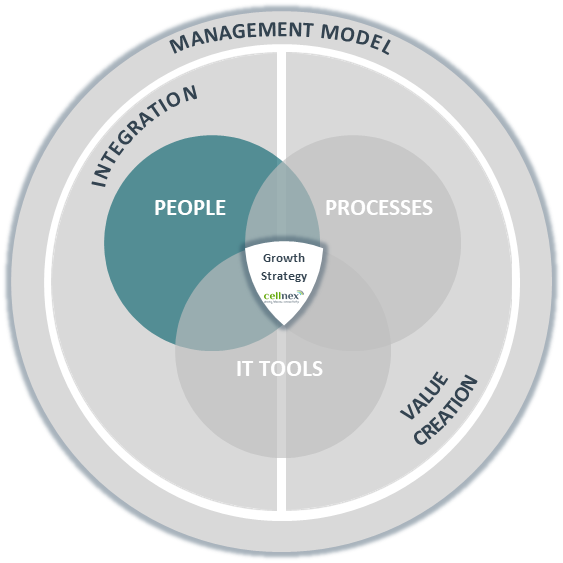
The people of the company are essential for Cellnex’s success and are therefore a fundamental pillar of the Growth strategy, together with its processes and IT Tools.
To ensure that the Company has the best talent and culture, Cellnex has built a People Strategy underpinned by 3 pillars: culture, leadership, and talent.
The first pillar is culture, understanding as a constructive culture built on the Company’s core values, that promotes collaboration and cohesion to achieve its ambitious goals.
The company is convinced that a great team is not a group of people that work together but a group of people that trust each other, that values all voices and promotes equal opportunities for everyone. To achieve this, Cellnex promotes inclusive leaders who lead driven by these same values and convinced that everyone is a leader, which means that everyone must lead themselves first, learning, performing and contributing. Everyone contributes to the teams they work with and leads with humility to achieve the company goals.
The third pillar is talent, which means managing globally in a consistent way to attract and develop diverse talent, as well as allowing equal opportunities. Cellnex needs to ensure that the team has the right capabilities and does this by promoting two main mindsets. The first involves a learning environment where we learn every day, all the time – in short, a lifelong learning approach. The second mindset involves self-leadership - encouraging everyone to be the best version of themselves.
All of this is underpinned by the company’s main belief that the best way to grow is together.
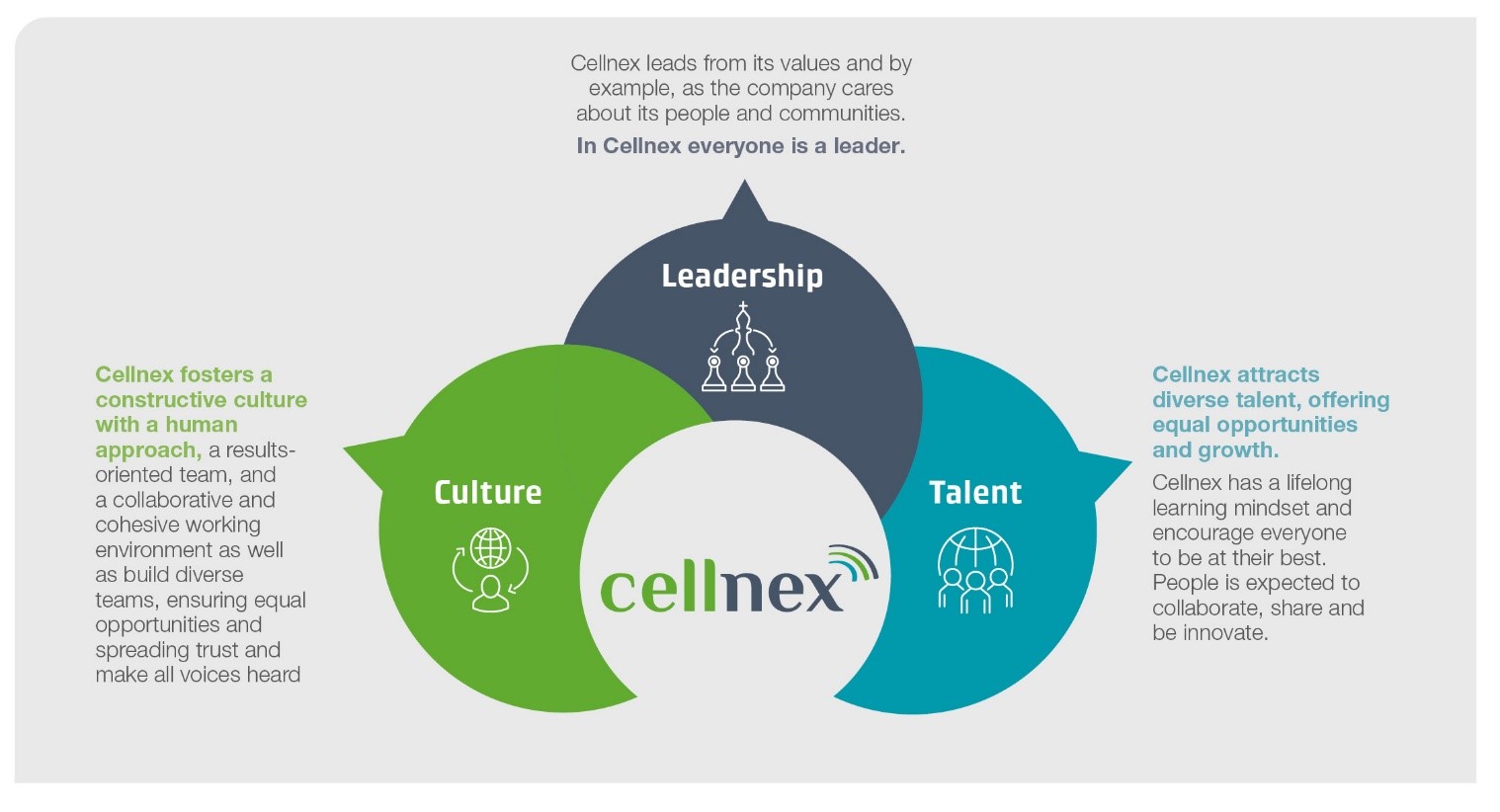
People management
Cellnex multidisciplinary team is key to a successful business project, which enables Cellnex Telecom to be one of the main telecommunications infrastructure operators in Europe. As of 31 December 2020, the total workforce of Cellnex group is 2,008 employees (1,605 people as of 31 December 2019). The workforce increased over the previous year in the wake of the new acquisitions made and in accordance with the company's needs.
Although the workforce force is predominantly male, which reflects the current situation in the sector, the efforts being made by Cellnex to improve female representation in the sector are reflected in the data. Furthermore, Cellnex also promotes the inclusion of employees with different abilities. In this regard, in 2020 there were 15 employees in the company with different abilities (13 in 2019).
It should be noted that even during the global COVID-19 pandemic, Cellnex has been able to grow. In this regard, Cellnex group recruited 468 new employees in 2020 (205 women and 363 men). The people that were onboarded displayed a very even gender parity and very solid and diversified backgrounds.
Culture
The company is currently working to develop and deploy a Corporate Culture built on the values that best define the company and its employees. Cellnex defines its culture in action by:
- Being attractive and a recognised great place to work.
- Being competitive, promoting careers and growth to ensure everyone is at their best.
- Being collaborative to accelerate connections and share how-know.
- Being responsible, people focus on their own development and the social responsibility linked to Cellnex’s purpose of connecting people.
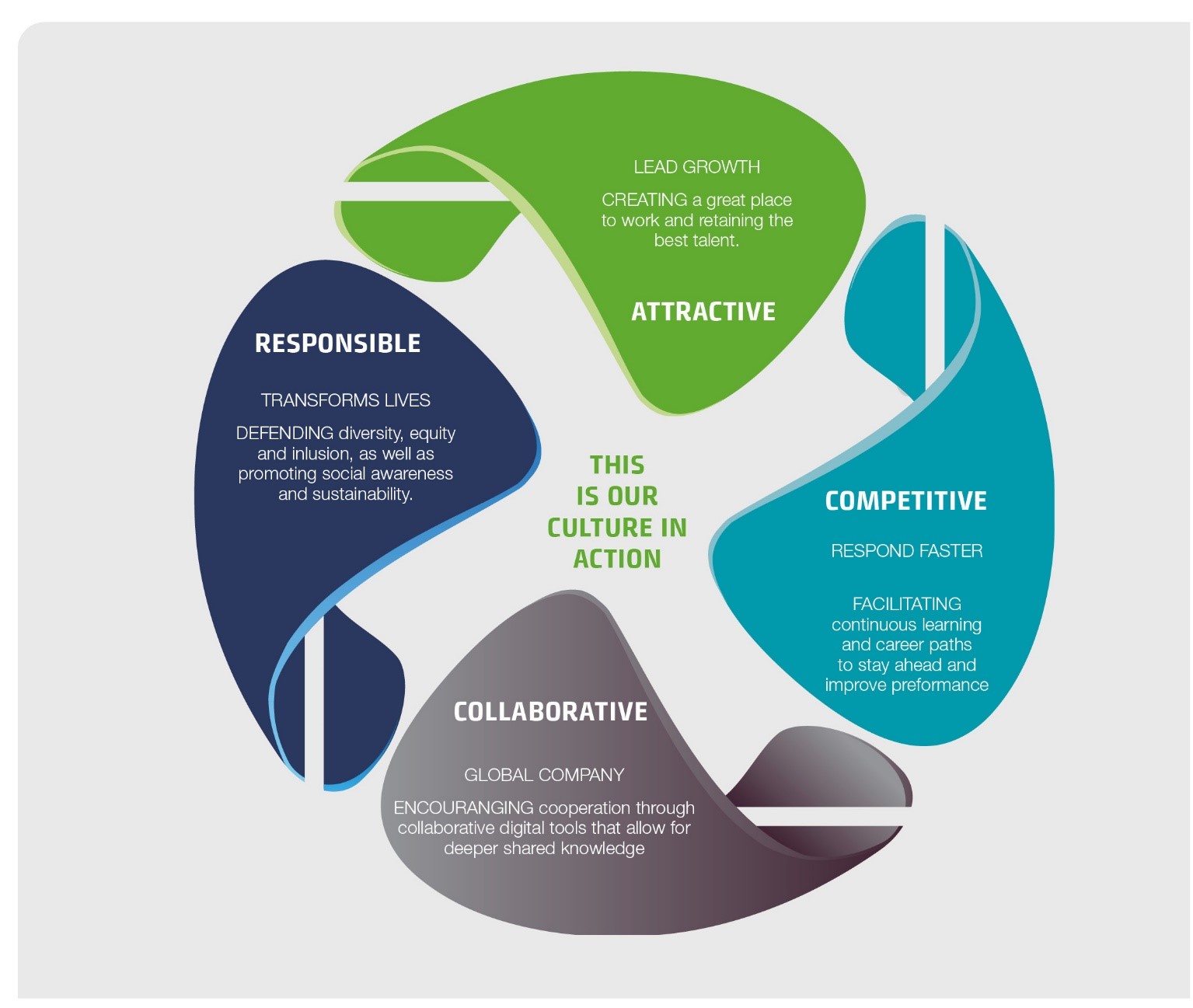
In order to deploy the new Corporate Culture in the company, key initiatives have been rolled out like the updated Cellnex group Purpose, Vision, Mission and Values, Cultural initiatives across the various countries and deploying Equity, Diversity and Inclusion in all countries of the Cellnex group.
Revamp Cellnex group Purpose, Vision, Mission & Values
Over the past five years, Cellnex has grown exponentially and the company will grow even more, which is why Cellnex considers it essential to reflect on and refine its purpose, vision, mission and values that are a tribute of the company and its ambition.
The Company plans to engage with the team in 2021 and deploy it globally and mainstream it in all people initiatives, since teams with a clear sense of purpose deliver better results, are highly committed and resilient, able to overcome any challenge.
Roll out Culture initiatives everywhere
During 2020, Cellnex refocused on raising its sights towards team engagement and commitment, rolling out initiatives based on listening to employees. Also, to accompany the Cellnex team to drive constant change by increasing engagement, sense of belonging, pride and participation.
Deploying the Cellnex group’s Culture helps to transmit culture and purpose as a global and international group to integrate and modulate behaviors towards a common project.
These key behaviors have been considered at the new leadership model and are embedded in the learning programmes such as 360 while they are also considered in the performance and development appraisal, among others.
Expected behaviors in the Cellnex Ideal Culture are:
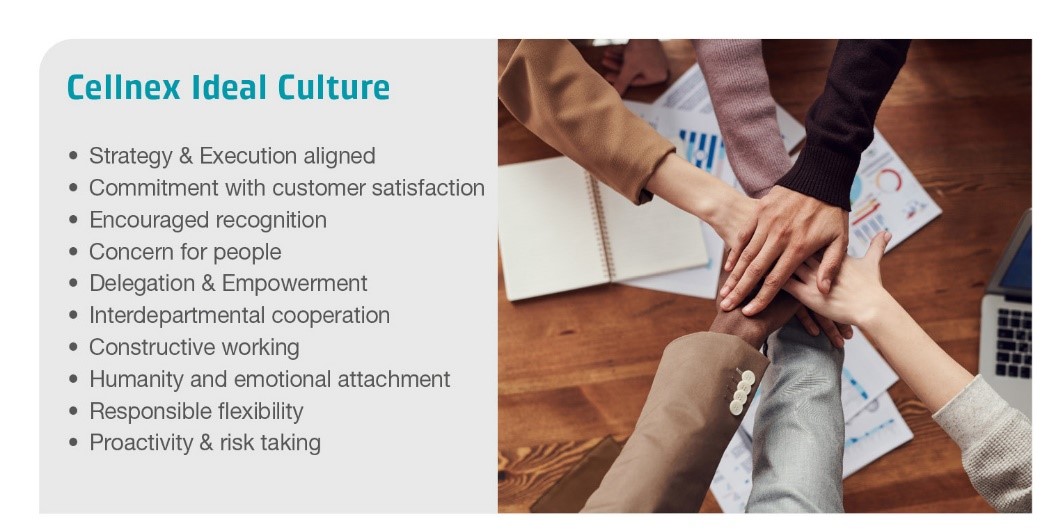
In this context, a Community program is being defined at group level as a force of cohesion, leading to the rolling out of initiatives including:
- 5th Anniversary - Growing together is part of this, therefore the first virtual meeting with the whole group involved the launch of a short concert to celebrate our anniversary.
- Virtual Sant Jordi in Spain, the Catalan tradition in which books and roses are given to loves ones, was shared through the group. More than 1,200 books and roses were downloaded.
- New Perspectives, a series of testimonies from some of Cellnex’s colleagues explaining how they are facing the crisis of COVID-19 in their jobs.
- On holiday: a summer photo contest.
- Global coordination Meeting 2020- the global top 100 virtual gathering.
- Cellnex- Christmas Carol contest - Eurovision. The company celebrated the first virtual Christmas celebration, simulating the Eurovision song contest.

Value project
Cellnex Spain implemented an engagement project to value cross-transversal work in the territory and Network Operation Centre (NOC) through the “Who is who: testimonials from people who do field work”.
This initiative shows the work performed outside the central offices and highlights the value and transversally of end-to-end teams and projects, which generates greater engagement with employees located outside the headquarters and increase the feeling of "one team" and a shared goal.
Community Program
The Community programme aims to make all Cellnex employees feel part of a wider family, sharing new ideas and attitudes from everywhere. A Global Community Team in each country will be consolidated to achieve this.









Cellnex boosts employee collaboration and participation using the intranet. During 2020 there were improvements in the Global Intranet launched in 2019. The intranet is understood as a workplace with a broader concept and new functionalities (allowing everything to be done from anywhere and at any time, taking into account any relevant regulations and legal requirements).
Cellnex also launched a specific blog called Teams for teams, with tips and tricks as well as tutorials. A newsletter for all managers is also being used to share specific information and to promote the culture of collaboration and participation.
It is worth pointing out that the COVID-19 situation has made it difficult to deploy all the strategies that were intended within the Culture Project, but the actions planned for 2020 were developed.
In this regard, a survey report was launched during COVID-19 lockdown to glean an understanding of people’s feelings and perceptions of remote working. The survey showed that 88% support new community initiatives. Moreover, in Cellnex France they consult their employees on a monthly basis on various topics, such as COVID management (barometer).
During this period, Cellnex has been clear that its priority was the health and safety of the people who are part of the group. To this end, all countries promoted remote work and provided the necessary means to work from home properly.
The pandemic meant that countries had to adapt their initiatives to continue maintaining a corporate culture. For example, Cellnex Spain held weekly virtual meetings, team building, maintaining engagement, etc. as a differentiating element with respect to the previous year. This way of working helps the company move forward: holding meetings using online apps, becoming more cooperative and flexible in our relationships.


Virtual coffee during Covid-19 lockdown
At Cellnex Netherlands, informal meetings were held every Friday as a “Virtual coffee” to update about various topics at business and organisational level.
Those meetings helped build a more cohesive team that could no longer meet so regularly because of the distance between offices.
Moreover, the HR team talks regularly with employees to field their concerns and check if they are doing well. There is also an external coach available for all employees, who can share their feelings about the COVID-19 situation with him in a very confidential way.
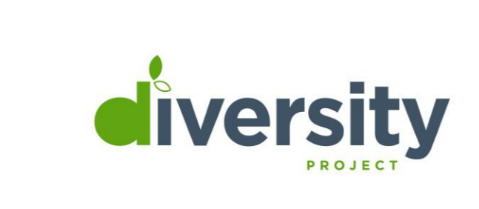
Equity, Diversity and Inclusion plan rolled out across countries
In line with the process of cultural transformation and integration in which the Group is currently immersed, Cellnex understands diversity as one of the key elements of its business model. Diversity and inclusion bring unique perspectives to the company and help to create a respectful and inclusive work environment that meets the expectations of different groups, improving employee performance, attracting and retaining the talent of the best professionals and improving the company performance.
In this regard, Cellnex group is firmly committed to equity, diversity and inclusion, defining an Equity, Diversity and Inclusion Policy that establishes the guidelines and lines of action in this area for the entire Cellnex group, approved by the Board of Directors in December 2019. Along with the policy, Cellnex has drafted an Equity, Diversity and Inclusion Programme that defines the lines of action, commitments and strategic lines.
The Equity, Diversity and Inclusion Programme includes all the countries and business units, but is also transversal, not only involving the People department, but also affecting all areas of the company and all levels, from new arrivals to the Executive Committee, showing that the company has clearly identified its diversity drivers.
Equity, Diversity and Inclusion Program
The Program consists of 90 specific actions that have been scheduled over the four years (2019-2022) resulting from five lines of actions (gender, generational, affective-sexual, cultural and functional) in addition to a transversal of communication and awareness line of action.
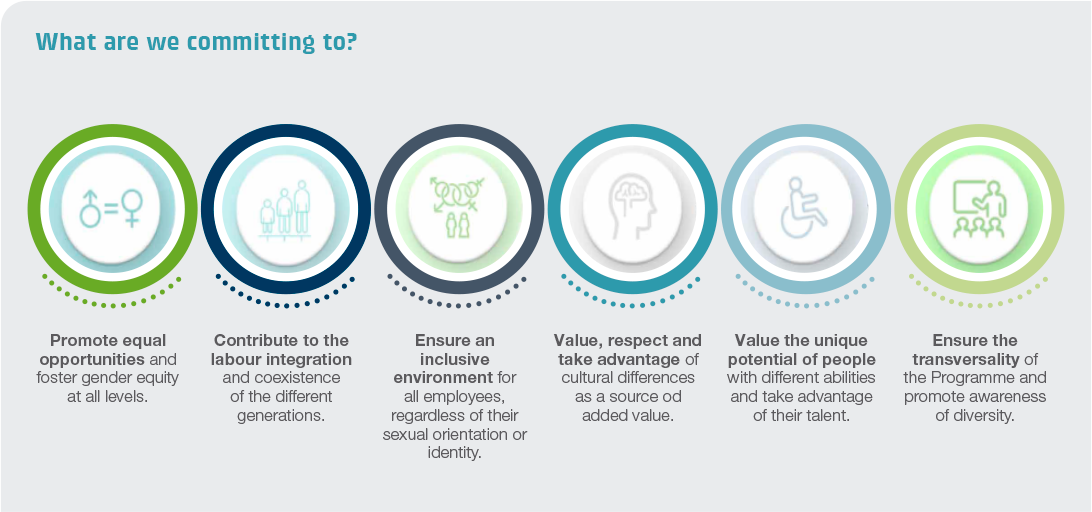
KPIs and objectives to be achieved in some actions have been defined to ensure the implementation of the Programme. Specifically, 60 of actions have a KPI and 28 have an associated quantitative objective.
The Equity, Diversity and Inclusion Programme was rolled out across the countries during 2020, with an initial diagnosis to identify the main elements of the generation gap within the organisation. The diagnosis was made up to the closing date of 31 December 2019 and was updated in April 2020. In the diagnosis, each country's starting point has been analysed in terms of age, gender, professional category and nationality, and the GAP calculated in relation to the objectives set out in the Plan.
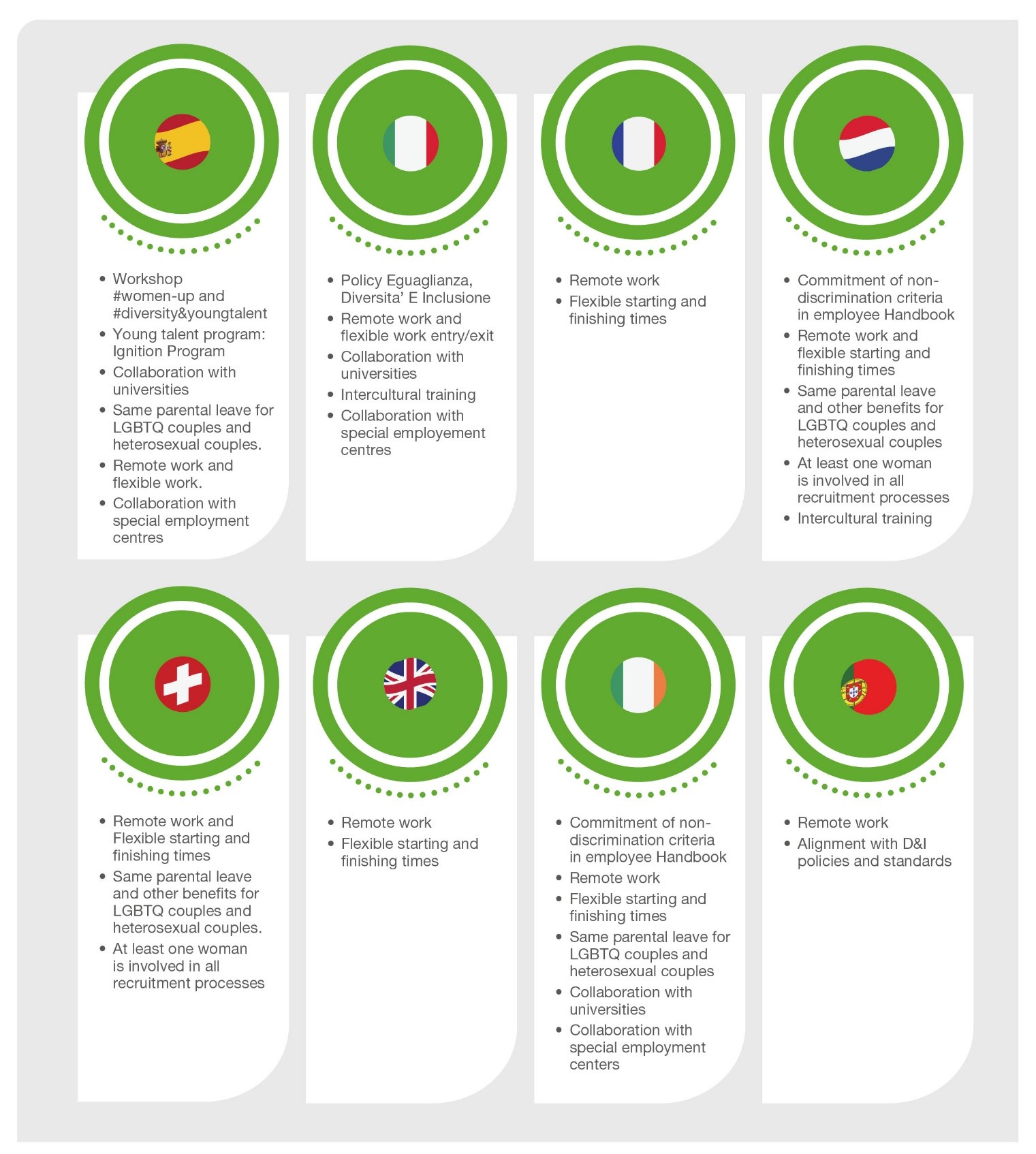
The policies and criteria for recruitment in most Cellnex countries have been reviewed and updated, ensuring non-discrimination on the basis of gender, age, sexual orientation or gender identity, race, religion, thought or social status or disability. Moreover, the recruitment process has being adapted to boost diversity by requesting applications from women or sending blind curriculums in most countries. These actions are being monitored through the report of different KPIs such as female curriculums received or anonymous curriculums. |
Cellnex Diversity Week
Activities related to diversity were organised over a week to coincide with International Pride Day, allocating one day for each of the five lines of action: gender, generational, affective-sexual, cultural and functional.
Noteworthy examples are a livestream with Marieta del Rivero, member of the Board of Directors of Cellnex; diversity content and quizzes; Internal communication about LGTBIQ International Pride Day; diversity e-learning catalogue; and diversity and inclusion awareness materials circulated among Management.








Cellnex Corporation also defined a Protocol against harassment and discrimination based on sexual orientation or gender identity. The protocol aims to establish mechanisms to prevent and eradicate situations constituting sexual harassment on grounds of gender, sexual orientation and gender identity within Cellnex group companies.
An inclusive language manual was also defined, including the five diversity axes of Cellnex (gender, generational, affective-sexual, cultural and functional). The use of language reflects the cultural and social practices of the social context that can limit human conceptions in certain areas. Furthermore, language is our form of communication and includes our way of thinking. It is therefore important for the language used by our employees to reflect Cellnex's values, which include equity, diversity and inclusion. Given the diversity that exists among the companies composing the Cellnex group, each country will adapt the manual to its language and context.

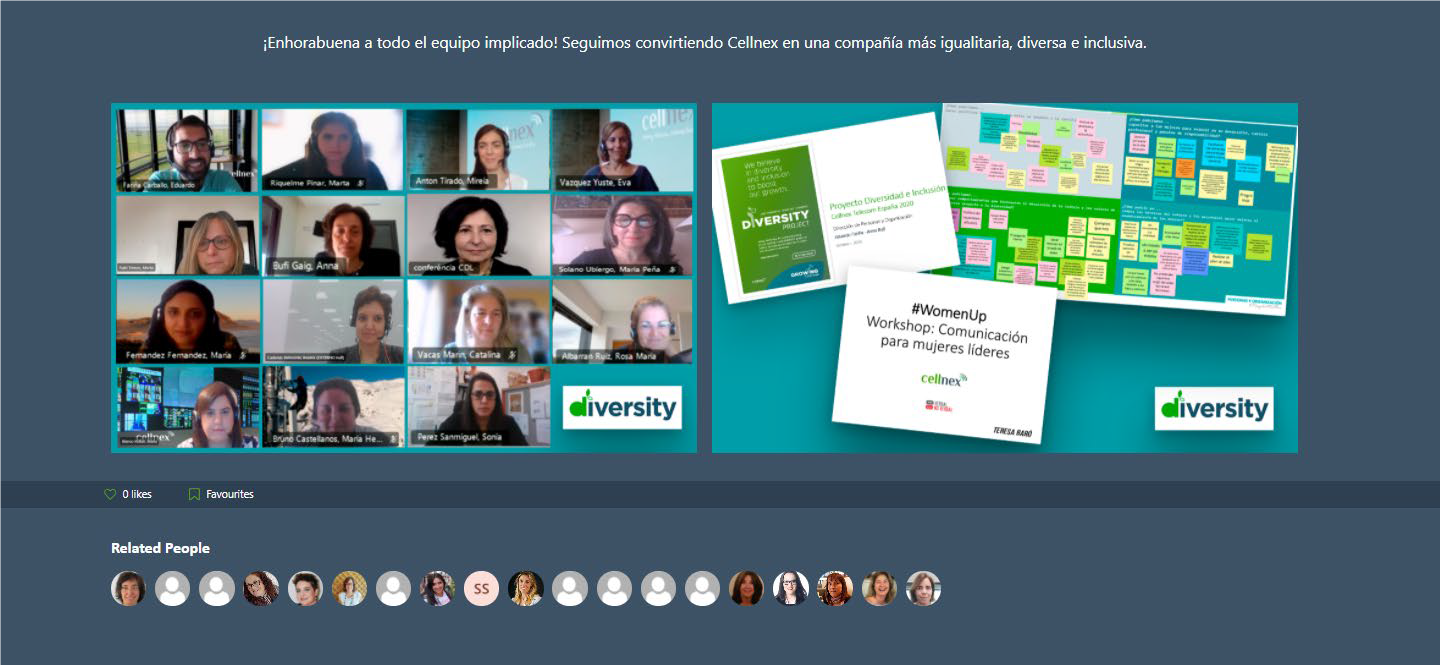
#women-up workshop
This four-hour women’s virtual workshop aims to offer women at Cellnex the chance to pool their vision, expectations and needs as “women of talent” within the Equality, Diversity and Inclusion Programme. Teresa Baró, a specialist in language and communication matters, participated as speaker at the workshop after the D&I presentation. There was then a collaborative exercise based on streamlined methodology to push participation & collaboration, using on-line post-its to answer key questions about gender diversity in Cellnex. This workshop was designed as a cross-cutting initiative to listen to female talent in the company and give visibility to women of all levels and representation of all company management.

Given the success of the project, four additional training sessions with the external expert will be held for all women (first step) at Cellnex Spain in 2021.
#diversity&youngtalent Workshop
The workshop was set up to learn the opinion of young people from the digital generation about gender and generational diversity and better define the next steps and promote gender and generational diversity. This is a transversal initiative and covers the Ignition project and diversity as well as inclusion objectives.
Equality Plan
Cellnex's Second Equality Plan 2018-2022 was launched and signed together with the workers representatives in 2018. The general objective of this plan is to progressively increase the number of female employees in all positions and responsibilities, guaranteeing equal treatment and opportunities for women and men and preventing sexual harassment and gender discrimination, both indirect and direct. The actions set out in this Equality Plan focus on a range of areas that cover almost the entire company and include recruitment, training, awareness-raising and work/life balance.
A Monitoring and Evaluation Committee will ensure that Cellnex complies with the Equality Plan, by evaluating the Plan annually to examine compliance with the measures adopted in the Plan, assess whether the measures are appropriate, and to check that they match the objectives initially proposed.
On 2021, the Equality Plans of Retevisión and Tradia will be updated and a new Equality Plan for Cellnex Telecom will be defined, in order to cover all the employees of the company based in Spain and also to adapt these plans to comply with the new regulatory framework approved in October 2020 in this regard.
Specific training sessions were held on equality issues during 2020, for example the courses entitled "Lead in diversity successfully" and "Cultural diversity: intercultural communication".
Work-life balance and labour flexibility
In Cellnex a good work-life balance is important for the way of working as well as creating a good and successful cooperation between colleagues, for the development of the business as well as for the personal element of everyday working life.
In this sense, all employees of Cellnex group generally have flexible hours, choosing within a margin of hours when to start their working day, provided they work the number of hours established by agreement and contract by the end of the day.
Likewise, all Cellnex’s Group employees can take the holidays established by the agreement throughout the year, by prior agreement with the head of the department. All employees who have requested a reduction in working hours are granted this right. During 2020, due to the COVID-19 pandemic and lockdown, the dates on which workers could enjoy summer vacations have been made more flexible.
Moreover, in recent years Cellnex group has worked on the implementation of remote work progressively in all countries, with Cellnex Italy being the leading country of reference in this field.

Smart working mode
In 2016 Cellnex Italia adhered to a full “smart working mode” for all the technicians working in the field because of their responsibility to manage, maintain and develop the infrastructure portfolio across the country.
Then, in 2018 the “smart working mode” scope was expanded to all Cellnex Italia employees in an experimental way, giving employees the opportunity to do this for two days a month. This initiative allowed Cellnex Italia to be ready to face the COVID-19 emergency without having to stop production.
Smart working represents a genuine revolution in terms of work culture and sustainability since it optimises time and saves money, improving work organisation and offering greater flexibility to genuinely apply the concept of "work-life balance".Due to the exceptional situation caused by COVID-19, most of the employees in all the countries that are part of Cellnex group have worked from home in recent months.
Cellnex employees also currently enjoy a range of economic and social benefits including life and accident insurance, pension plans and health insurance, among other benefits accessible through MyCompensa Portal.
In addition, the company offers some conciliation measures based on diversity and equity such as:
- Adaptations of the working day.
- Pooling hours allowed for breastfeeding.
- Prenatal exams.
- Leave of absence for childcare.
- Wedding leave.
- Maternity and paternity leave.
All employees can access the work and life balance measures through their intranet, in the section "My time" in the MyCompensa Portal.
A survey among employees in 2020 asked about their assessment of the catalogue of reconciliation measures of "MyCompensa" portal. Once the feedback has been analysed, improvements will be made in these measures, adapting them to the needs of the employees.
Some changes were observed in the wake of the implementation of the existing flexibilisation and conciliation measures in 2020. For example, in Spain there was a significant increase in the number of women and men who have requested adjustments to the working day as well as a decrease in the number of requests for reduced working hours for both men and women. Moreover, the number of men requesting the pooling of hours for baby feeding and the number of childcare leave applications among men increased.
Likewise, Cellnex has developed a digital disconnection policy to guarantee our employees’ right to privacy in relation to the digital environment and guarantee effective rest to protect the health and safety of our employees. In January 2020, the procedures related to work disconnection measures and time registration were signed and presented to the legal representatives, thereby complying with the legal requirements.
Other countries of the Cellnex group do not have labour disconnection measures, with the exception of Cellnex France since they have a Disconnection Charter. The countries are working on this topic in cooperation and collaboration with Celnex Corporate.
Collective agreements
In Spain, the Cellnex Telecom group is made up of several companies: Cellnex Telecom, SA, Cellnex Telecom España, SA, Retevision I SA, Tradia Telecom SA, On Tower, XOC, Adesal and ZENON. The employees of these companies are covered by different collective agreements.
At Cellnex Telecom, SA, Cellnex Telecom, SAU, and On Tower, the personnel have a benchmark provincial collective bargaining agreement which, according to the opinion issued by the National Consultative Commission of Collective Bargaining Agreements, for the Barcelona centres is applicable the collective bargaining agreement of iron and steel industry in the province of Barcelona and for the centre of Madrid, it is applicable the collective bargaining agreement metal industry, services and facilities sector of the Community of Madrid.
Both Retevision I SA and Tradia Telecom SA have a Company collective bargaining agreement valid until 31 December2020. However, the social dialogue held throughout September 2020 made it possible to reach an agreement to extend the validity of the current collective bargaining agreement until 31 December2021.
The personnel of the XOC company are governed by the collective bargaining agreement for the “Office sector” in Catalonia for the years 2019-2021.
ZENON personnel are governed by the collective bargaining agreement for the “Commerce sector” in Catalonia for subsectors and companies without their own collective agreement.
ADESAL personnel have a reference collective bargaining agreement for the “Office sector”.
Cellnex UK, Switzerland, and Portugal there is no Collective Agreement. In France, the country's Telecommunications sector agreement is followed. Also, Cellnex Italy’s employees are covered by collective bargaining agreement.
In 2020, 74% (82.4% in 2019) of Cellnex group workers were covered by a collective bargaining agreement.
Social dialogue
Cellnex promotes dialogue with its employees and their legal representatives, such as workers councils and employees’ representatives; informing, consulting and negotiating accordingly with them.
In Spain, at Retevision I SA, there are currently four union sections represented: CCOO Union, STC Union, SI Union and CSIF Union. In addition, there is an Inter-Centre Committee that represents all employees and union sections. The members of the Inter-Centre Committee are, in turn, either personnel delegates.
The social dialogue is developed through the Inter-Centre Retevision Committee, which is composed of 12 members. There is also a fluid dialogue with the three Company Committees that have been set up in Retevision. They are:
- Company Committee of Madrid comprising 9 members.
- Company Committee of Barcelona comprising 9 members.
- Company Committee of Valencia comprising 5 members
At Tradia Telecom SA, there are currently three union sections represented: CCOO, STC and UGT. The mechanisms of social dialogue are produced through the Inter-Centre Committee of Tradia, made up of 9 members. There is also a fluid dialogue with the Barcelona Company Committee.
Both Retevision I SA and Tradia Telecom SA, the dialogue is maintained with the different personnel delegates in those work centres where there are no Company Committees. There are also different commissions constituted by the legal representation of the workers and the management of the Company. For example, the employment commission, the social action commission, the Inter-centre health and safety committee, etc.

Social dialogue during the COVID-19 situation
Throughout 2020, there was an intense dialogue with the legal representation of Retevision and Tradia Telecom workers on everything related to COVID-19, where every fortnight there were a follow-up meeting on the impact of the pandemic on the Company. Thanks to these meetings it has been possible to sign with the entire legal representation of Retevision and Tradia Telecom workers the gradual recovery plan.
Another milestone that flowed from the intense social dialogue maintained during 2020 was the signing of the agreement on the registration of the working day and its implementation, and the agreement on digital disconnection. Both have been extended to other group companies domiciled in Spain.
Both On Tower and XOC have a union representative at the Barcelona workplace. The companies Cellnex Telecom, SA, Cellnex Telecom España, SA, ZENON and Adesal have no employee representatives.
On the other hand, Cellnex Italy created a new "Social Performance Team" committee in 2020 that holds meetings at least twice a year, or more if they receive grievances to discuss and to solve. The topics discussed by the Social Performance Team are related to "social responsibility of the Company" (SA8000) and "health and safety in workplace" (ISO45001).
In the UK, there is the Cellnex UK Colleague Board (the CCB), whose aim is to represent the views and thoughts of colleagues across the business in all major people related developments and decisions. The CCB follows a “2-way approach”, as sometimes it will involve consulting with colleagues on proposals and other times it will involve presenting feedback and new ideas gathered from colleagues. Some of the topics that the CCB may be involved in shaping include:
- Colleague Engagement plans
- Equity, diversity and inclusion implementation across the organisation
- Proposing changes to HR policies
- Promote of learning and development across the organisation
- Internal communication
- Championing of Health and Safety
- Wellbeing of colleagues at work
- Formal consultation processes
In other countries such as Cellnex Switzerland, Netherlands, Ireland or Portugal, workers committees do not exist. In relation to Cellnex Switzerland, the Labour Act (art 37 - art 39) and the Co-determination Act (art 1 et seq.) stipulate other types of participation such as employee representation and participation, which includes the right to be consulted and to have a say, but not the right to co-decision. An employee representative body also known as a works committee:
· Can be appointed in workplaces with at least 50 employees (Co-determination act art. 3)
· Must be appointed for the first time in workplaces with more than 500 employees if at least 100 employees request it (Co-determination Act art. 5).
There was no legal claim from the employees, nor has any collective dispute raised by the legal representation of the workers in any of the Cellnex group companies domiciled in Spain. Nor have there was any complaints to the Labor Inspectorate in 2020. All of that is due to a fruitful and intense dialogue that takes place constantly between the company's management and the workers' representatives.
There have also been no complaints in other countries where Cellnex is established except in Cellnex UK (one complaint) and France (two complaints). The Cellnex UK complaint is resolved while the Cellnex France complaints are in process of resolution.
There is an e-mail and a corporate Intranet application to allow any Cellnex worker to blow the whistle on any situations in which worker safety could be compromised.
Talent and Leadership
Talent
Cellnex's strategy promotes the development of all its employees, focused on business needs and unlocking everyone’s growth potential. Cellnex aims to grow talent by the principle of Development for all.
The four pillars in which the talent strategy is based are:
-
Acquisition
To attract new potential employees in line with the company’s goal, Cellnex is defining an Employee Value Proposition and an Employer Branding and has designed a Proactive Talent mapping. To build a “next generation of Cellnex people”, it is important to keep core values and upskilling, as well as increasing Diversity and setting a Global mindset. 468 new employees from different nationalities joined the company in 2020.
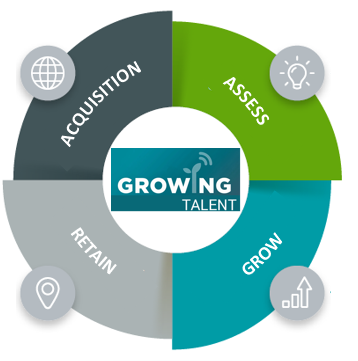
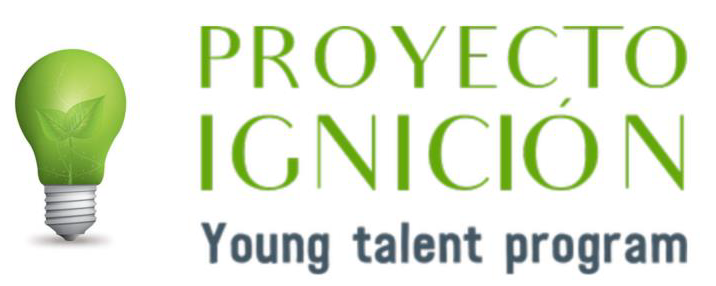

Ignition Project
This young talent programme is a strategic talent recruitment pool and an employee branding project that aims to identify our strategic pool of young talented people, promote generational diversity, have an excellent relationship with universities and improve our reputation.
In 2020 Cellnex Spain underwent a very positive development in terms of women hired internally or externally (35.29% in 2020 vs 30% in 2019) marking a higher percentage of women enrolled in the fields of STEM careers. However, Cellnex maintains its commitment to continue increasing the percentage of female interns until it reaches 40% and achieving gender balance.
Cellnex has defined a new process of global onboarding, adapting to the virtualisation of the new situation caused by COVID-19 and under the prism of the user experience and increased sense of belonging. In this regard, Cellnex has automated its selection processes by incorporating a comprehensive talent management tool called The Hub.
The Hub
The Hub is the Corporate tool used to provide all Cellnex Employees with the resources for their career development. Cellnex has signed an agreement with Linkedin which strenghthens the learning content by more than 16,000 training contents on various topics available. During their onboarding in the company, all employees will be introduced to The Hub and its functions










Talent review
The yearly talent review process was consolidated during 2020 with the talking talent sessions with managers to identify talent, risk identification, development needs, and succession plans to build up the talent pipeline for the company’s future growth. The talent review programme aims to retain and develop people and ensure a talent mapping to cover our company’s needs.
- Assess
One of the main goals of the strategy is to identify and promote the potential talent of each employee. To that end, Cellnex has two tools to evaluate employee’s performance: Development Dialogues and Management by Objectives. In addition, a professional development assessment is performed.
Cellnex approaches this in a holistic way, with a person-centred contribution driving business and individual growth.
Management by Objectives (MBO)
MBO comprises four types of objectives: Group, Country, Area and Individual. All the objectives will be defined during the first quarter of the year. The role and position of the employee will determine her/his profile and therefore the weight of each type of objectives. Group and Country objectives are defined at corporate level, Area objectives are defined by the director / manager and sometimes the Head at corporate level of the relevant Business Line of the area and validated by the management, and individual objectives are defined jointly by the employee and the manager, in alignment with the objectives of the area and country. |









- Grow
Cellnex promotes individual development as well as a teamwork mindset. In this regard, an Individual Development Programme is established for each employee, reinforcing Cellnex’s 70/20/10 learning model, as well as their career aspirations. People are encouraged to acquire new skills, competencies and behaviours.
For the teamwork mindset, Cellnex focuses on leadership, collaboration and agility. In this regard, Cellnex has kicked off a pilot on agile methodology that could be rolled out in 2021 across the organisation.

Individual Development Plans and Development Dialogues
The Skills Development guide, provided via the Hub, provides employees with the tool and the guidance to create and follow an Individual Development Plan (IDP). The activities and ideas from this tool enable the employee to achieve improvement goals and provide support for attaining the skills the employee wants (or needs) to develop and/or enhance. At least once a year, employees will have a Development Dialogue with their manager, as part of the IDP. The employee will work with the manager to jointly set goals, define activities and identify possible training needs. People and Organisation can support and advise in this process. |
This process will be introduced and monitored via The Hub along with the plan agreed with the manager
- Retain
In recent years, Cellnex has laid the foundations for the “great place to work” that Cellnex aspires to be: a company with a strong purpose. This is the magnet that makes people stay committed and being part of the company journey.
Cellnex’s Employee Value Proposition is based on:
- Culture & purpose
- Job content (Job Levelling) and working conditions
- Career progression
- Competitive compensation (My Compensa)
Cellnex has been working for the past few years to define common positions and profiles for the entire company, especially in view of the new incorporations of countries that have taken place.
Work has also been done to define a remuneration policy for each position and a profile that would be competitive with the market in each country. Cellnex is aware of the high competitiveness of the telecommunications market, which is why Cellnex wants to compensate all its workers.
One of the fundamental components of Cellnex’s remuneration strategy is the annual Variable Remuneration (VR), an incentive that rewards excellent performance, promoting contribution and added value, in a limited period.
The individual employment conditions agreed upon with every employee establish the VR potential of the employee’s salary.
The VR is set up through the Management by Objectives (MBO) system, a systematic evaluation method that seeks an overall alignment of efforts, to attain the development strategy of each business unit, and the particular objectives of the areas. The ultimate goal of the MBO is to support the business strategy and achieve the results expected by the market.

Job Levelling
The Job Levelling project was developed in 2019 in the wake of the large number of integrations into Cellnex Telecom, to level standardise Cellnex's professional categories. The project, which defines an exclusive job catalogue and common positions framework for the entire Cellnex Telecom Group, drives talent and global mobility and delivers competitive rewards, while addressing business needs: talent attraction, engagement and key talent retention. |
Job levelling is deployed on a permanent basis as the new incorporations are being integrated into job levelling. Salary benchmarking was carried out in all countries except the UK (in the process of organising positions) and is being completed in Ireland and Portugal.

My Compensa
In addition to economic compensation, Cellnex employees also benefit from a range of social benefits, including life and accident insurance, pension plans and health insurance. These economic and social benefits can be found in the "My Compensa" portal.
Each country has different perks and benefits, and employees use My Compensa to manage these as well as receiving summaries of each benefit. It also includes salary information and can be used as a Human Resources administration website.
In 2020, all countries were integrated, except Netherlands (which has been delayed due to an office change) and UK, which will come on stream in 2021.
Leadership
Cellnex's strategy promotes values to make everyone a leader within the company by establishing a Cellnex Competences and Leadership model, performing a career development assessment, retaining key people for the company, and promoting individual development.
The four pillars in which the leadership strategy is based are:
- Cellnex Leader’s DNA:
Cellnex has defined a Competencies and Leadership model which is aligned with business ambition and strategy, emphasising inspiration and transformation, the growth mindset and operational excellence as well as people-centred growth and inclusion.
The leadership model is underpinned by the mindset that “everyone is a leader”, fostering self-leadership across all levels of the organisation. Cellnex defines its leaders’ DNA as being:
- An Inspirational Leader, connecting people.
- A Transformational leader, to drive business growth.
- An Operation leader, to ensure business sustainability.
- A Leader coach, to build one joined team.
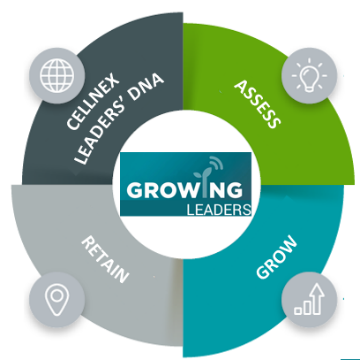
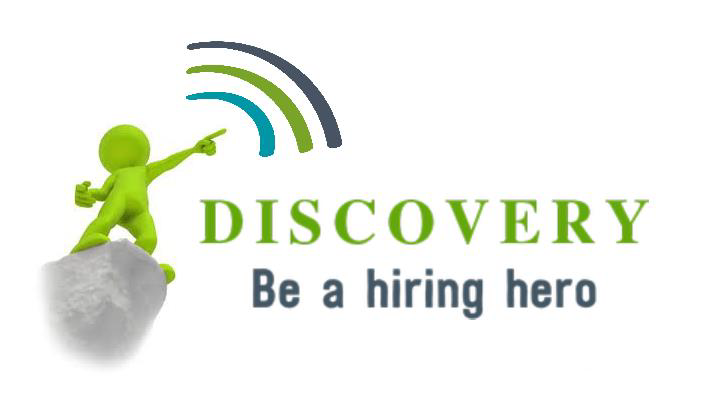

Hire to Grow project
Hire to Grow Project is a training project for hiring managers to be better "recruiters" of staff, with a procedure and training for selection based on competencies. This project contributes to a recruitment policy that aims to attract talent among profiles that can contribute diversity and join teams to meet the challenges of the future.
The project is being implemented in various phases and will provide an interview guide by competencies and e-recruitment and online training for all managers who participate in recruitment processes.
- Assess
Cellnex launched several projects during 2020 to boost and assess its people’s leadership skills:
- Career development assessment: a model used across levels, directors, middle managers and individual contributors, on demand to support individual development and also used consistently for all new team members joining Cellnex from the M&A.
- 360º: full evaluation of directors with a subsequent coaching programme. 71 Directors were evaluated in 2020.
- Coaching for new Managers: each newly appointed Manager is supported by a psychometric assessment and provided with coaching to support their first steps by leading teams.18 new Corporate managers took the assessment in 2020.
Moreover, Cellnex has launched an Executive Development Program (Succession Plan) for Cellnex Leaders. In 2020 59 Directors and Top managers have participated. The Program is focused on assess individual capabilities to:
- Align with new organization
- Strengthen developmental plans
- Next generation of Leaders
- Executive education

Agile LeaderShip
20-hour training for a Human Resources group in agile mindset and methodologies to promote and evolve towards a flat, collaborative and agile company. An agile methodology process and approach was also used in key projects.
- Grow
Cellnex promotes the individual development and the teamwork mindset. For individuals to grow, Cellnex has established an Individual Development Plan and is providing resources to further develop their employees’ Leadership skills. To foster a teamwork mindset, Cellnex is focusing on enhancing diversity (gender and generational diversity), identify key talent and pool talent.
Some of the projects developed in this regard are:
- The leadership corner:
Harvard Mentor: an online platform from Harvard Business School with plenty of resources related to the leadership role (articles, training sessions, videos, templates etc) to support the leadership growth of all our Managers and Directors.
- Leadership Training: direct access to your current training sessions.
- Development Guide: easy access to our Skills Development Guide in which you will find plenty of ideas to create individual development plans according to the 70 / 20 / 10 model.
- My Dashboards: in which you can find the results of your last Development Dialogue.
- My Team Dashboards: Access to graphics with relevant information about your teams included in the hub (development dialogues, training, MBO, etc.)
- Connecting Together: with direct access to the Intranet’s blog.
- Cellnex MBA: in collaboration with EADA. The first edition of Cellnex MBA was launched in 2020 to improve middle managers’ knowledge of Strategic, Functional, Innovation, Leadership and Digital and focus. This first edition involved 20 team members globally, for example, some Cellnex France employees took part in the course. The second edition is currently in preparation.
- Emotional leadership and seven Habits Programme. More than 180 leaders (80% of Cellnex Leaders) participated in the Emotional Leadership Programme or Seven Habits Programme to improve soft skills and boost the Cellnex core competencies.
- The leadership corner:

Train to Grow programme
Approximately 30% of training at Cellnex is internal, i.e., given by volunteer employees themselves. Cellnex created the "Train to Grow" programme, which consists of a specific workshop to highlight the work done by the internal trainers in Spain.
- Retain
A Retention plan was developed to retain key talent, and focused on:
- Competitive compensation & global benchmarking.
- Job content & career progression.
- Alignment with Company values & strategy / Culture.

Internal mobility
In Cellnex France opportunities for internal mobility have been offered between business units, organisations, etc., responding to requests by employees. This internal mobility helps to improve learning skills while increasing contacts between co-workers.
Training
Cellnex is firmly committed to providing training to its employees by making a wide variety of courses available to its workers, some of which are mandatory, depending in some cases on the position of the employee. For example, mandatory training courses are the Code of Ethics and Several Information security courses. Examples of specific training are in Access to Technical buildings or Safety Managers VCA basis. . During 2020 the total hours of training were 59,104 hours (54,318 hours in 2019), being the average hours of training per employee 29.93 hours in 2020 (34.36 hours in 2020).

External study
The individual development plan, or IDP, is defined in accordance with the individual and professional development and training needs that the employee discusses with their manager. This is the basis for approval of any training application.
With the IDP, the employee has the chance to steer their career within the organisation in a proactive manner.
In the context of the COVID-19 pandemic, the continuity of the training career of all employees has been guaranteed by converting 93% of training curriculum into a virtual format. In this regard, Cellnex has carried out a pilot project to provide its internal trainers with the necessary skills to adapt to the virtual environment. Moreover, there was the launch of the LinkedIn online training platform with access to more than 16,000 training contents for all Cellnex employees.

Lean Six Sigma training
Thanks to the efforts made by Cellnex, Cellnex UK has more than 100 employees trained in Lean Six Sigma and who completed many continuous improvement projects resulting in cost savings and productivity improvements.


 15 0.7%
15 0.7%
 15 0.7%
15 0.7%
 3 0.1%
3 0.1%